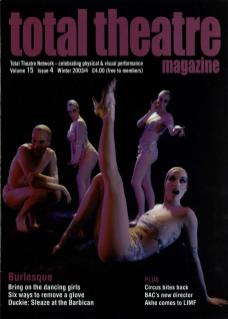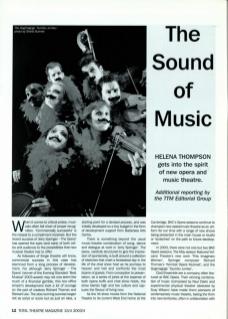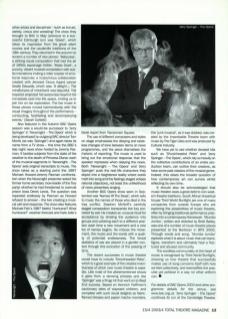When it comes to critical praise, musicals often fall short of proper recognition. ‘Commercially successful' is the closest to a compliment received. But the recent success of Jerry Springer - The Opera has opened the eyes (and ears) of both critics and audience to the possibilities that new musical theatre has to offer.
As followers of fringe theatre will know, commercial success in this case has stemmed from a long process of development. For although Jerry Springer - The Opera (winner of the Evening Standard Best Musical 2003 award) may not now seem like much of a financial gamble, this box office smash's development took a lot of courage on the part of creators Richard Thomas and Stewart Lee. The slow burning success began not as script or score but as just an idea, a starting point for a devised process, and was initially developed on a tiny budget in the form of development support from Battersea Arts Centre.
There is something beyond the usual music-theatre combination of song, dance and dialogue at work in Jerry Springer. The piece, carefully structured to give the impression of spontaneity, is built around a collection of sketches that chart a fantastical day in the life of the chat show host as he journeys to heaven and hell and confronts the most bizarre of guests. From conception to presentation, as a series of jokes at the expense of both opera buffs and chat show hosts, the show blends high and low culture and captures the flavour of living now.
As the hit show moves from the National Theatre to its current West End home at the Cambridge, BAC's Opera seasons continue to champion new opera/music theatre as an artform for our time with a range of new shows being presented in the main house or studio or scratched on the path to future development.
In 2003, there were not one but two BAC Opera seasons. The May season featured Volcano Theatre's new work This Imaginary Woman. Springer composer Richard Thomas's Kombat Opera Klubneit, and the Gogmagogs' Gumbo Jumbo.
Clod Ensemble are a company often featured at BAC Opera. Their winning combination of music (composed by Paul Clark) and experimental physical theatre (directed by Suzy Wilson) have made them pioneers of contemporary music theatre, taking the form into new territories, often in collaboration with other artists and disciplines – such as live art, variety, circus and wrestling! The show they brought to BAC in May (previous to a successful Edinburgh run) was Greed, which takes its inspiration from the great silent movies and the vaudeville traditions of the 19th Century. They returned in the autumn to scratch a number of new pieces: Babycase, a striking visual composition that had the air of a 1950s espionage thriller; Brass Octet, a punchy, vibrant musical composition with subtle intonations inviting a rollercoaster of emotional response; a music/circus collaboration created with Jerwood Circus Award winner Gisele Edwards, which was: ‘A delight... The mindfulness of movement was beautiful. The trapezist projected her awareness beyond the immediate task into the space, inviting us to join her on her exploration. The live music in these pieces moved harmoniously with the visual imagery throughout the performance – conducting, facilitating and accompanying events.' (Sarah Corbett)
Also featured in the Autumn BAC Opera season was a would-be successor to Jerry Springer in Newsnight - The Opera which is being developed by outgoing BAC director Tom Morris (as was Springer) and again takes its name from a TV show – this time the BBC's late night news show hosted by Jeremy Paxman. It tackles subjects from the state of the weather to the death of Princess Diana: each of the musical segments in Newsnight - The Opera sets original transcripts to music. The show takes as a starting point the 1997 Michael Howard-Jeremy Paxman confrontation when the Newsnight presenter asked the former home secretary (now leader of the Tory party) whether he had threatened to overrule prison boss Derek Lewis. The question was repeated endlessly by Paxman as Howard refused to answer – the two creating a musical call-and-response. The show also features Michael Fish's 1987 fateful 'Hurricane? What hurricane?' weather forecast and Kate Adie's bleak report from Tiananmen Square.
The use of different composers and styles on stage emphasises the dizzying and tasteless changes of tone between items on news programmes, and the piece dramatises the rhetoric of reporting. The music is used to bring out the emotional response that the speaker represses when relaying the news. Both Newsnight - The Opera and Jerry Springer push the real-life characters they depict into a heightened reality where words melt into song and the feelings staged eclipse rational objections, not least the unlikelihood of news presenters singing.
Another BAC Opera show seen in September was Names Of The Dead, which sets to music the names of those who died in the Iraq conflict. Stephen McNeff's carefully staged composition transcends the fury provoked by war. He creates an unusual ritual for acceptance by dividing the audience into groups and ushering each to a different position each time a new movement and a new list of names begins. He imbues the movement, the music and the words with a quality of potential endlessness. The brutal statistics of war are placed in a gentler context through this evocation of the passing of time.
The recent successes in music theatre would have to include Shockheaded Peter, which is a good example of the creative inventiveness of which new music theatre is capable. Like most of the aforementioned shows it grew from a devising process and like Springer was a fringe hit that went on to West End success. Based on Heinrich Hoffman's cautionary tales of wayward children, and complete with such visual delights as fabric-flamed dresses and papier-mâché monsters, this ‘junk musical’, as it was dubbed, was created by the Improbable Theatre team with music by The Tiger Lilies and was produced by Cultural Industry.
We have yet to see whether devised hits such as Shockheaded Peter and Jerry Springer - The Opera, which rely so heavily on the collective contributions of an entire production team, can outlive their creators, as have some past classics of the musical genre. Indeed, this raises the broader question of how contemporary art can survive whilst reflecting its own time.
It should also be acknowledged that music-theatre owes a great debt to non-western theatre traditions. South African theatrical troupe Third World Bunfight are one of many companies from outside Europe who are exploring the possibilities of music theatre, often by bringing traditional performance practices into a contemporary framework. Mumbo Jumbo, written and directed by Brett Bailey, was one of a number of music-theatre pieces presented at the Barbican in BITE 2003. Through words and song, Mumbo Jumbo explores what it is about music that can transfigure, transform and ultimately heal a fractured and abused community.
The wordless communality at the heart of music is recognised by Third World Bunfight, showing us how theatre that successfully makes use of song concerns itself with how we feel collectively, and exemplifies the populist yet political in a way no other artform can.
For details of BAC Opera 2004 and other programme details for the venue, see www.bac.org.uk
Jerry Springer - The Opera continues its run at the Cambridge Theatre.


